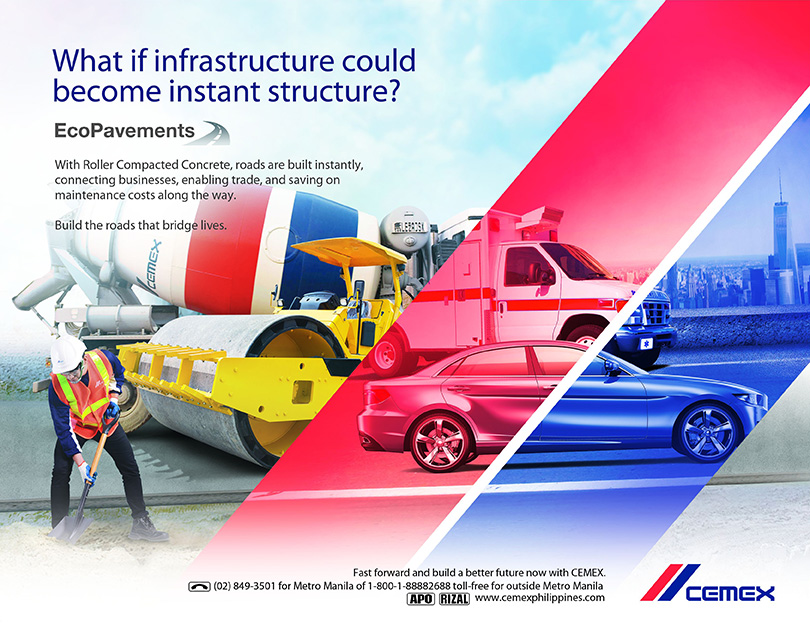DPWH certification makes way for newly paved roads to be passable in 3 days
The Department of Public Works and Highways has issued Department Order No. 134 that certifies the use of CEMEX’s Roller Compacted Concrete or RCC in the construction of farm-to-market roads and industrial parks, making CEMEX the premiere building solutions company in the Philippines to offer this technology to reputable developers, private contractors, and now to the DPWH.
RCC is a fast acting dry mix pavement application that addresses two of the most important needs in construction: speed and cost efficiency. Compared to conventional concrete, RCC is easier to apply and it cures faster. Vehicles can pass through a newly paved road using RCC after 3 days or 72 hours, compared to 14 days using conventional concrete.
“The DPWH Department Order was issued after conducting extensive laboratory and field trials to test RCC’s adaptability to local weather conditions and traffic. The Department Order will signal to DPWH regional and local offices that RCC can now be used in government projects with massive concrete requirements,” said Engineer Reynaldo Faustino, DPWH Assistant Director for Bureau of Research and Standards.
“The government has limited resources when it comes to product research. We partner with the private sector to bring in new technologies that can be used here in the country. This is an example of how collaborative research between government and private sector can be used for public good,” added Faustino.
The CEMEX Research Group developed RCC through thorough research activities in Switzerland before it was brought and tested here in the Philippines. RCC employs the same design methodology and support structure as conventional concrete without the need for reinforcing steel and bars. Its lower maintenance requirements allow contractors and developers all over the country to maximize their construction budgets.
In the Philippines, CEMEX responds to the enormous infrastructure demands of the country, the most apparent being the need to ease traffic congestion through the construction of new roads and highways. Another long term requirement is the development of infrastructure that will support national growth. These initiatives would benefit from quality construction solutions that are quick and cost efficient.
“Apart from manufacturing and distributing cement, CEMEX aims to provide technological innovation to its customers. The company is committed to building better roads that address the present and foreseeable needs of the future. We also support building public infrastructure that drives nation-building. We take on the challenge of providing not only superior building materials, but also high quality solutions that put customers at the heart of our efforts,” said Arturo Rodriguez Jalili, Technical and Product Development Director at CEMEX Philippines.
CEMEX’s RCC uses trusted cement brands Island, Rizal, and APO and over the past 2 years, has partnered with companies like Volvo, who used RCC to pave its industrial yard in Novaliches. Other RCC projects include the Peaksun Equipment Yard in Antipolo, residential roads in Axeia Development Corporation’s Santorini Estates, and the Ocean Transport Yard in Manila.
“Speed and cost efficiency are two of the most important variables when laying out construction plans. RCC provides a solution that addresses these basic construction needs, paving the way for construction that will pose the least inconvenience to the riding public. It is a win-win solution for the government, developers, contractors, and commuters,” said Rodriguez Jalili.
CEMEX commits to delivering innovative solutions for building the nation. Through solutions such as Promptis 1-day concrete and RCC, CEMEX continues to pursue advancements which drive efficiency and sustainability.

CEMEX building materials technology development and application projects are part of the global R&D collaboration network, headed by CEMEX Research Center, based in Switzerland
ADVT